Share

The SEI Podcast Series
Bringing together thought leaders from across the University and beyond to tackle the greatest challenges of our time.
Latest episode
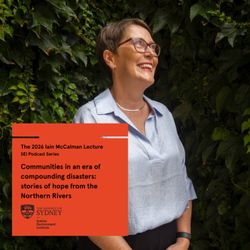
Communities in an era of compounding disasters: stories of hope from the Northern Rivers
01:09:31|The 2026 Iain McCalman Lecture was delivered by Dr Rebecca McNaught as she shares lessons from the ground-up of communities stepping up in extraordinary ways in response to climate disasters. Dr McNaught explores what it means to move beyond a disaster response mindset toward a vision of proactivity and well-being in the face of compounding disasters.Timestamps:00:50 - Welcome from Prof David Schlosberg08:00 - Professor Vicki Flood introduces the keynote speaker12:17 - Dr McNaught introduces herself and the University Centre for Rural Health18:11 - Context of compounding disasters 25:28 - Community action after floods 35:27 - Dr McNaught and her colleagues' embedded research45:35 - Calls to action for policy-makers, donors, universities and disaster practitioners 57:08 - Beck Dawson respondsSpeakersDr Rebecca McNaught, Faculty of Medicine Professor David Schlosberg, Sydney Environment InstituteBeck Dawson, Henry Halloran Urban Regional Research InitiativeProfessor Vicki Flood, Head of Rural Clinical School
More episodes
View all episodes
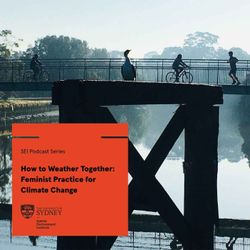
How to Weather Together: Feminist Practice for Climate Change.
01:00:48|In this episode of the SEI podcast series, hear from leading voices on feminist approaches to climate change, Professor Astrida Neimanis and Dr Jennifer Mae Hamilton. This event explored feminist practices for climate change, focusing on weathering, embodied experience, inequality, and collective care. Timestamps: 00:50 - Welcome by chair Natali Pearson 05:10 – Introduction to Weathering, Climate Change and The Weathering Collective. 08:46 – About the book 10:14 - Starting points for reimagining weather 12:18 - ‘Why we speak about weather in an expanded sense’ 30:23 - Weathering as a framework and practice for climate change. 39:00 - Examples of feminist infrastructures developed to practice weather together 53:08 - Closing remarks Speakers: Professor Astrida Neimanis Dr Jennifer Mae Hamilton Dr Natali Pearson (Chair)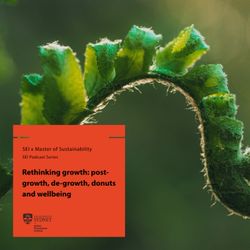
Rethinking growth: Post-growth, de-growth, donuts and well-being
56:52|Unpack the growth paradigm and hear from thinkers reimagining economies built around well-being, climate justice, and living within planetary boundaries. This event is part of SEI’s Climate Justice Series. This panel series brings together leading thinkers and practitioners to explore the urgent intersections of climate action, equity, and systemic change.Timestamps:00:50 - Welcome and acknowledgement of Country04:32 – Mengyu Li 14:44 – Julia Steinberger20:16 – Manfred Lenzen24:32 – Annette Cowie32:39 - Sharon Friel40:50 - What is the one benefit you wish people understood about post-growth?45:50 - Q+A beginsSpeakers:Chair: Zoe WhittonMengyu Li, University of Sydney Julia Steinberger, University of LausanneManfred Lenzen, University of SydneyAnnette Cowie, NSW Department of Planning and EnvironmentSharon Friel, Australia National University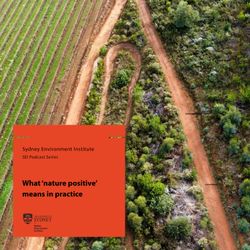
What ‘nature positive’ means in practice
52:34|‘Nature positive’ is everywhere but what does it really mean? In this instalment, hear expert insights on its use in policy, conservation, and finance, and who stands to benefit. This event is part of SEI’s Climate Justice Series. This panel series brings together leading thinkers and practitioners to explore the urgent intersections of climate action, equity, and systemic change.Timestamps:00:50 - Welcome and acknowledgement of Country06:01 – Dwayne Mallard on dignity having currency and value10:34 – Hugh Possingham on the difficulty of measuring nature17:57 – Chloe Fisher on private sector investment in nature23:05 – Jody Gunn on what principles should guide conservation and the finance sector32:00 - Thoughts on 'perfection is the enemy of the good'41:20 - Q+A beginsSpeakers:Chair: Carolyn HoggDwayne Mallard, ArjawayChloe Fisher, sustainability reporting expertHugh Possingham, former QLD Chief ScientistJody Gunn, conservation scientist and leader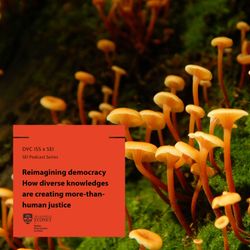
Reimagining democracy: how diverse knowledges are creating more-than-human justice
01:00:47|In this instalment of the SEI Podcast Series hear from leading environmental figures to explore models of more-than-human governance, drawing from Indigenous knowledges, creative and legal practices, and innovative research. This event is part of SEI’s Climate Justice Series. This panel series brings together leading thinkers and practitioners to explore the urgent intersections of climate action, equity, and systemic change.Timestamps:00:50 - Welcome and introduction07:30 – Patricia Gualingua on the Kawsak Sacha (Living Forest Declaration), translated by Silvia R. Martínez15:219 – Nardi Simpson on music, land and language22:53 – Paul Powlesland on the responsibility and possibility for transforming institutions32:20 – Shrishtee Bajpai on decolonisation and land rights in connection with more-than-human justice40:40 - What makes it possible for you to keep on imagining and embedding these possibilities in the present?46:38 - Q+A beginsSpeakers:Chair: Danielle Celermajer, Sydney Environment InstituteShrishtee Bajpai, Global Tapestry of AlternativesPatricia Gualinga, Sarayaku Indigenous rights advocateNardi Simpson, Yuwaalaraay storyteller, performerPaul Powlesland, Lawyers for NatureSilvia R. Martínez, Certified Conference Translator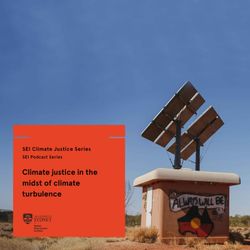
Climate justice in the midst of climate turbulence
51:59|In this instalment of the SEI Podcast Series, hear from leading voices as they discuss Australia’s urgent climate, housing and energy challenges, exploring solutions through inclusive decision-making, First Nations leadership, and innovative design to drive sustainable, equitable change for all.This event is part of SEI’s Climate Justice Series. This panel series brings together leading thinkers and practitioners to explore the urgent intersections of climate action, equity, and systemic change.Timestamps:00:50 - Welcome and introduction08:25 - Emma Bacon on how extreme heat is impacting society’s most vulnerable12:20 - Karra Kinchela on how fossil fuel extraction is effecting First Nations people17:30 - Amanda Tattersall on what does meaningful community engagement look like23:05 - Steve Hartley on how the planning system is managing a housing crisis and climate resilience31:00 - What climate justice issue should be prioritised on the federal government agenda? 39:40 - Q+A beginsSpeakersDavid Schlosberg, Director, Sydney Environment InstituteEmma Bacon, Executive Director, Sweltering CitiesSteve Hartley, Executive Director, Department of Planning, Housing & InfrastructureKarra Kinchela, Narrabri Community Coordinator, Lock the Gate AllianceAmanda Tattersall, Associate Professor of Practice in Urban Geography, University of Sydney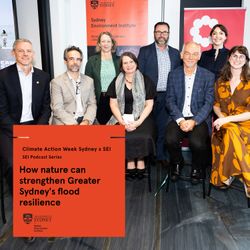
How nature can strengthen Greater Sydney's flood resilience
01:22:47|In this instalment of the SEI Podcast Series, discover how nature-based solutions can be integrated into urban and coastal planning to build resilience and improve ecological health whilst balancing competing demands for land use. Learn from successful projects, understand the challenges, and explore practical strategies to implement these solutions at scale. This event will be an exclusive preview of a new report that engaged with diverse stakeholders to understand how green and blue infrastructure can transform flood risk management in Greater Sydney.This event was held in partnership with the Sydney Environment Institute, Committee for Sydney, and AECOM at Climate Action Week 2025.Timestamps:00:50 - Welcome and introduction02:11 - Address by Beck Dawson and context of discussion 09:14 - Sam Kernaghan on Sydney's resilience during floods15:39 - Genevieve Wright on international examples of how nature is being used to stop flooding21:37 - Alice Simpson-Young on barriers for implementing nature-based solutions in Sydney 26:36 - How do we shift nature-based solutions to 'business as usual'?31:29 - Panel discussion begins31:52 - What are quick ways to embed nature-based solutions?35:36 - How can we integrate nature-based solutions and Disaster Adaptation Guidelines overview44:18 - The success of the GreenWay project53:07 - The Botany Wetlands system and tackling policy 1:05:11 - Q+A begins1:22:02 - ConclusionSpeakersSam Kernaghan, Director of Resilience Program at the Committee for SydneyNick Chapman, Resilience Specialist at Willoughby City CouncilBeck Dawson, Executive Director - Adaptation and Mitigation at the NSW Reconstruction Authority Dan Penny, Professor in the Faculty of Science at the University of SydneyAlice Simpson-Young, Principal Sustainability and Resilience Consultant at AECOMSarah Tasic, Assistant Director Disaster Risk Management at the NSW Reconstruction AuthorityGenevieve Wright, Senior Project Officer at the Sydney Environment Institute